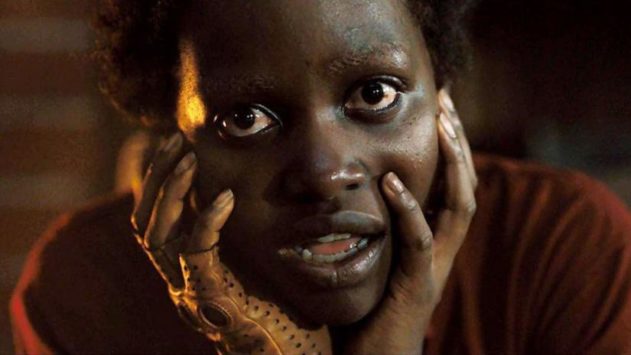Perhaps Us is about how scary it is to exist in this country right now, when so many people we’ve known all our lives have revealed themselves to be sociopaths or worse. Maybe it’s about the scary realization that we never know who will turn on us next, or when, or why.
“Therefore thus saith the Lord, Behold, I will bring evil upon them, which they shall not be able to escape; and though they shall cry unto me, I will not hearken unto them.”—Jeremiah 11:11, King James Bible
“We have met the enemy and he is us.”—Walt Kelly
“Outside it’s America.”—U2, “Bullet the Blue Sky”
In Jordan Peele’s brilliant, trippy, horrifying new film, Us, Adelaide Wilson (Lupita Nyong’o, in a staggering dual performance that would, were there any justice, nab her both a Best Actress and a Best Supporting nomination) and her family return to the scene of a childhood trauma, only to discover that what frightened her so badly has spread until it affects her family, her friends, perhaps everyone.
Or maybe none of that is exactly true.
Us continues a tradition of works that tell you a story and then undermine everything you think you know, such as Tim O’Brien’s The Things They Carried. Like many postmodern works of art, it is, at some levels, a pastiche—part slasher flick, part social satire, part allegory. Comparisons to the best works of M. Night Shyamalan don’t even do it justice, because Us is after something greater than twists that make us slap our foreheads, wondering how we didn’t see it coming all along. Peele may well have made a film that approaches Hitchcock.
You’ve probably seen the trailer, so it’s no spoiler to say that the film’s plot and its horror both hinge on doppelgangers. The second act’s reveal of the Shadow Family—doubles of Adelaide, her husband, and their two children—happens early. After that, the action-horror conflict dials up to 11, as Adelaide’s family battles scissors-wielding Shadows (their own and others’) to the death.
That alone might be enough for an above-average scary movie. But in Peele’s hands, Us transcends genre. I doubt that will stop the Academy from snubbing the film at the Oscars ceremony, if not the nominations, but it’s true.
There’s a scene in which Red, Adelaide’s double, smashes Adelaide’s face into a glass-topped table. We already know Red and Adelaide are dark reflections of each other, but in this scene, as they are reflected in the glass, we see mirror images of mirror images. Given the way Red speaks of people and their Shadows as being “tethered,” as two aspects of one being, these reflections of reflections call into question the very nature of being, of originality.
But Us goes even further than existentialism. When Red explains the origins of the Shadows, it’s possible to read the film as a metaphor for this country’s history of chattel slavery—their living conditions, their devastating connections to people with greater power, the multiple images of shackled bodies (particularly Nyong’o’s, which will alarm those who had enough of that in 12 Years a Slave).
On the other hand, given there are Shadows of everyone in the movie, regardless of race, some viewers will likely read the story as a commentary on how America creates a class of Disposable People—the homeless, the mentally ill, the disabled, and on and on. In a country that throws away so many of its citizens, who among us is ever truly safe?
Viewing the film through an even wider lens, it’s also possible to read Us as a metaphor for class war in America. The Shadows, after all, are indigent and forgotten—until they rise up. Except for Red, they are voiceless. And given Peele’s careful approach to filmmaking, it is no accident that the characters we follow are all economically stable. Adelaide’s family has a summer home near the beach; their friends Josh and Kitty (Tim Heidecker and Elisabeth Moss) have a better one, a two-story job with floor-to-ceiling windows and an Alexa-like AI. When a group of dirty, disheveled doppelgangers descend on these houses and take them over, that sound you hear may well be America’s aristocracy screaming in panic.
Despite all of this, other, even contradictory readings are possible. These violent, gibbering doppelgangers dress in red, the color of Donald Trump’s America, as they smash and stab, making America great again (for them) one body at a time. Perhaps Us is about how scary it is to exist in this country right now, when so many people we’ve known all our lives have revealed themselves to be sociopaths or worse. Maybe it’s about the scary realization that we never know who will turn on us next, or when, or why.
Or maybe, just maybe, it’s possible to read Us as a film about what happens when we give into despair, greed, envy, and hatred. When we link our hands together not in love and fellowship and empathy but in rage and “an eye for an eye” reciprocity. When we stop listening to each other. When we’re so busy shouting “what about me?” that we stop wondering what other people need, what kind of lives they’re living, what we might do to help.
“Who are you?” Adelaide asks.
“We’re Americans,” Red says.
How true. How frightening.
Brett Riley is the Pushcart-nominated author of The Subtle Dance of Impulse and Light (Ink Brush Press) and the feature-length screenplay Candy’s First Kiss, which won or placed in five contests. His short fiction has appeared in journals such as Solstice, Folio, The Wisconsin Review, Red Rock Review, The Evansville Review, and many others. Email him at officialbrettriley@gmail.com, or follow him on Twitter and Instagram: @brettwrites.
Other Links:

